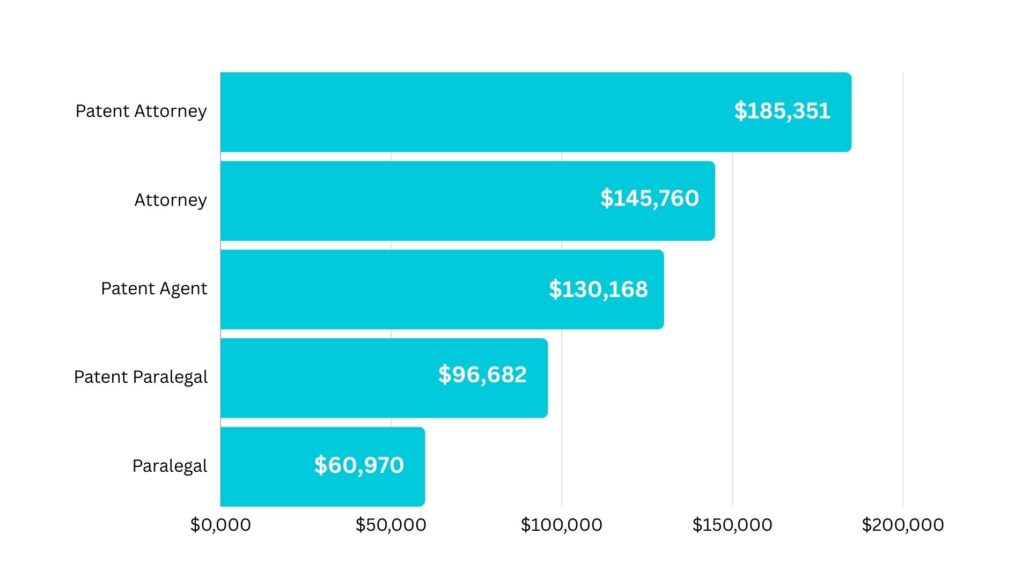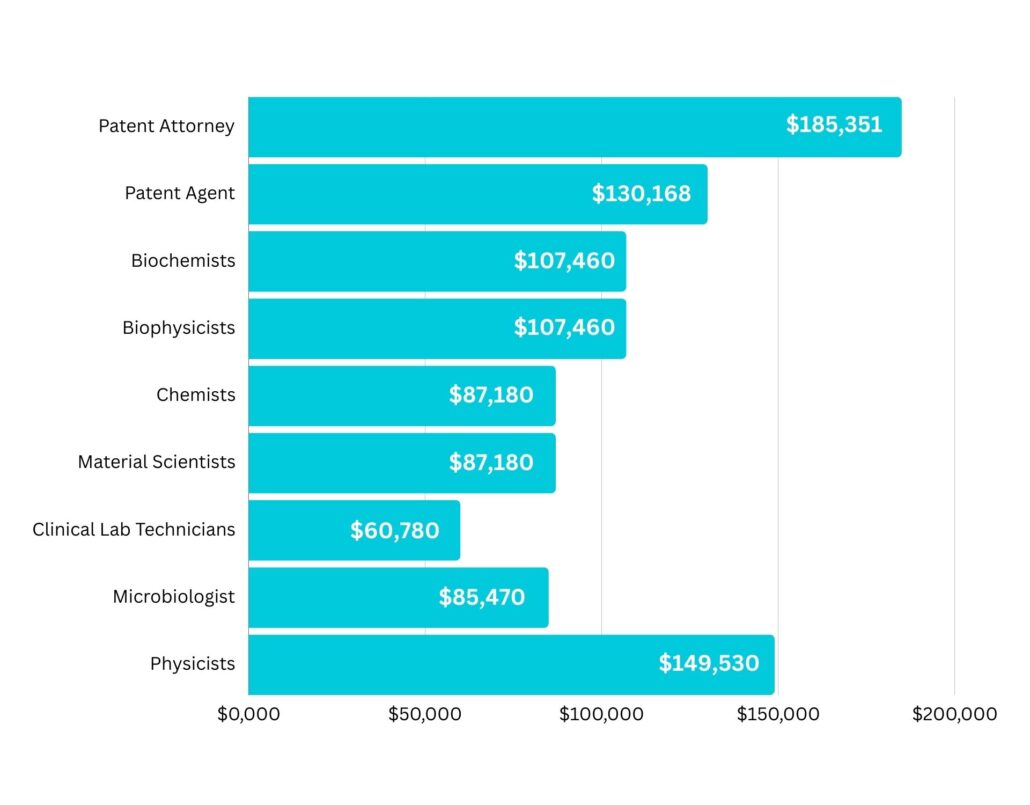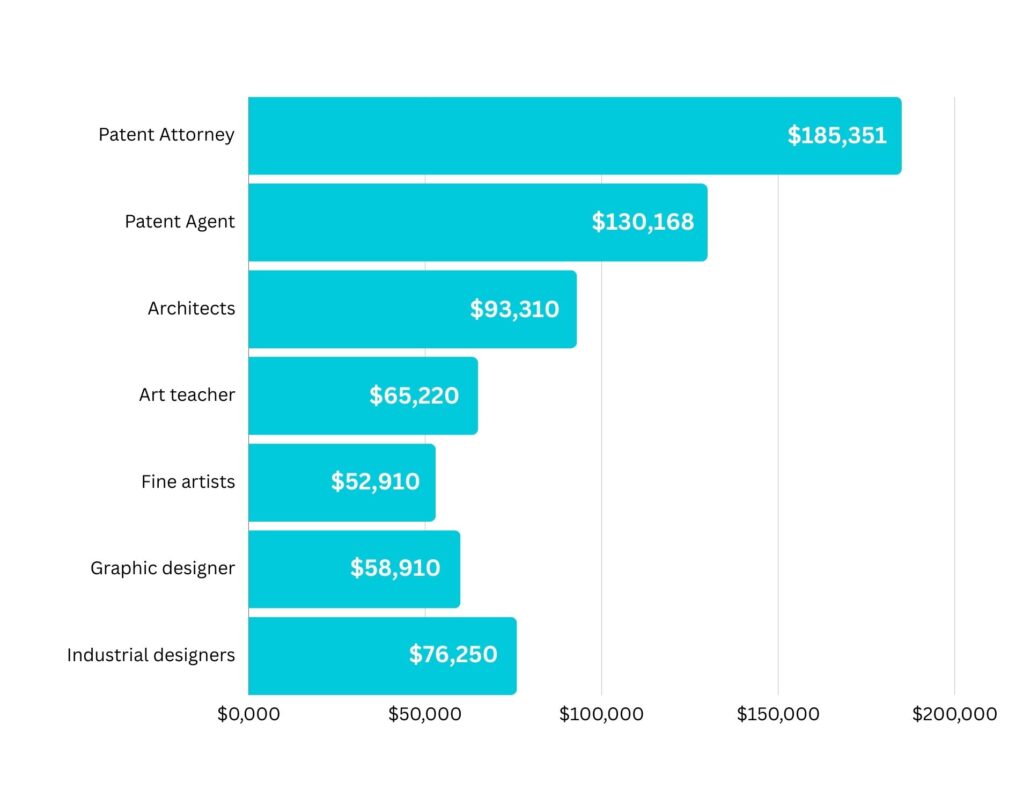PATENT LAW SALARY GUIDE
Dive into this essential guide and gain a competitive edge in patent law salary information.
This guide is a must-read resource that delves deep into earning potential patent agent and attorney salaries.
If you’re mapping out your career path, this guide equips you with detailed research and insights into salary ranges and the factors influencing these figures. We unlock the secrets behind your potential pay, empowering you to make informed decisions.
First, the average annual pay for patent attorneys is $185,351, and for patent agents, it is $130,168. The following is a breakdown of the pay ranges for both patent practitioners.
Patent Attorneys
Based on our findings, patent attorneys in the United States earn an average annual salary of $185,351, ranging from $119,188 to $285,530.
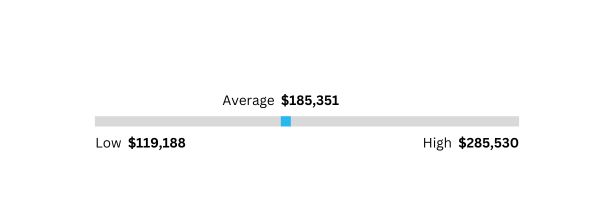
Patent Agents
Our research indicates that patent agents in the United States earn an average yearly salary of $130,168, ranging from $87,421 to $187,996.
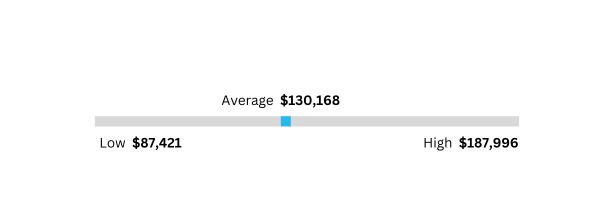
The rest of this guide compares the pay ranges of patent attorneys and agents against similar careers, especially those that are prerequisites to take the patent bar exam. This way, you can see if it’s worth it to you to take the exam. We also review the factors that will help you determine your salary.
Important notices:
- All the salary data came from BLS.gov except for our data on patent attorney, patent agent, and patent paralegal salaries, which we calculated from various reputable web sources.
- Please note that we are not making any income claims. These salary ranges are only based on general research. We urge you to research salary ranges independently, considering your factors.
Legal Salaries Compared to Patent Agent and Patent Attorney Salaries
The legal field is high-paying, and legal professionals in patent law make even more than the average professional in the legal industry. Taking the Patent Bar exam or learning about patent law can greatly increase pay for general attorneys and paralegals.
As you can see from the table and chart below, patent attorneys earn the highest average salary, $185,351, significantly more than general attorneys or lawyers, who earn $145,760 on average.
Patent agents earn $130,168, higher than the average salary for patent paralegals, $96,682, and much more than general paralegals, who earn $60,970. This data highlights the higher earning potential in patent-specific roles compared to general legal positions.
Science Salaries Compared to Patent Agent and Patent Attorney Salaries
When you think of scientists, you typically think of lab coats and chemicals; you don’t consider it the highest-paying profession. Many scientists with at least a Bachelor’s degree may qualify to sit for the Patent Bar exam. For scientists taking the Patent Bar exam, registration as a patent agent or attorney can bring a significant pay increase.
As you can see from the table and chart, patent attorneys earn the highest average salary, $185,351, and physicists, $149,530.
Patent agents earn $130,168, more than all the other professions shown in the information below, except physicists. However, patent agents with a background in physics will likely earn more than the average patent agent.
The data shows that biochemists and biophysicists earn $107,460, chemists and material scientists earn $87,180, and microbiologists earn $85,470. Clinical lab technicians have the lowest average salary, at $60,780.
This data shows that patent-specific roles generally offer higher salaries than science-related professions.
Engineering Salaries Compared to Patent Agent and Patent Attorney Salaries
Engineering is a respectable profession with higher-than-average pay. As an engineer, you may be interested in becoming a patent agent or patent attorney since most engineering degrees will typically allow you to sit for the Patent Bar exam. We’ve put together a table and chart for you to review the salaries compared together.
As you can see from the information provided here, patent attorneys earn the highest average salary at $185,351. Patent agents earn $130,168, slightly less than aerospace engineers at $130,720, petroleum engineers at $135,690, and computer hardware engineers at $138,080. However, patent agents or patent attorneys with a background in one of these engineering fields will likely earn more than the typical patent practitioner.
Patent agents earn more on average than all the other engineering fields in our compiled data. For example, they earn more than nuclear engineers at $125,460, more than mechanical engineers at $99,510, and significantly more than agricultural engineers, who earn the least among the listed engineering professions at $88,750.
Overall, patent-specific roles generally offer higher salaries compared to most engineering positions.
Bar Chart of Engineering Salaries:
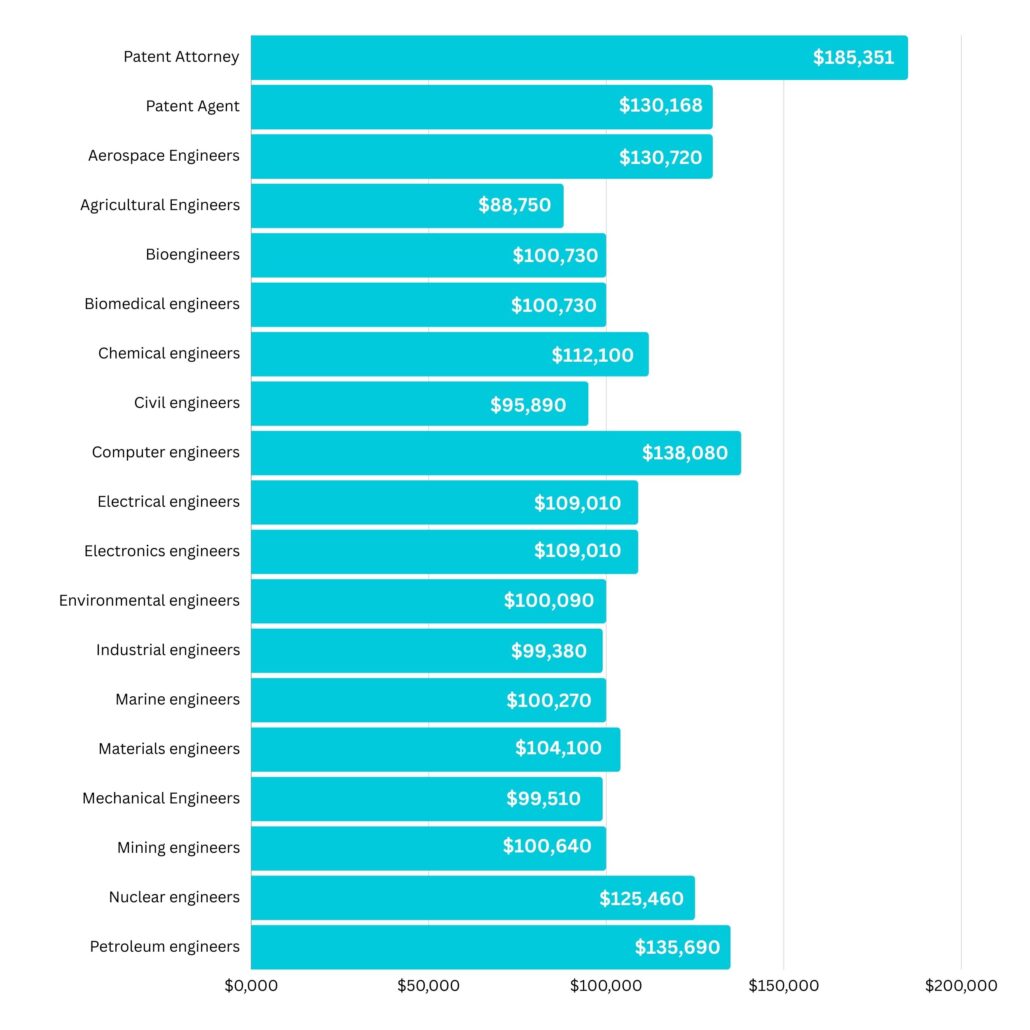
Table of Engineering Salaries:
| Profession | Annual Salary |
|---|---|
| Patent Attorney | $185,351 |
| Attorney/Lawyer | $145,760 |
| Aerospace Engineers | $130,720 |
| Agricultural Engineers | $88,750 |
| Bioengineers | $100,730 |
| Biomedical engineers | $100,730 |
| Chemical engineers | $112,100 |
| Civil engineers | $95,890 |
| Computer hardware engineers | $138,080 |
Table of Engineering Salaries (continued):
| Profession | Annual Salary |
|---|---|
| Electrical engineers | $109,010 |
| Electronics engineers | $109,010 |
| Environmental engineers | $100,090 |
| Industrial engineers | $99,380 |
| Marine engineers | $100,270 |
| Materials engineers | $104,100 |
| Mechanical Engineers | $99,510 |
| Mining engineers | $100,640 |
| Nuclear engineers | $125,460 |
| Petroleum engineers | $135,690 |
Design Salaries Compared to Patent Agent and Patent Attorney Salaries
Recently, the USPTO has allowed some designers to take the Patent Bar exam to become Design Patent Practitioners. Therefore, we’ve compiled the data to compare patent practitioner salaries with the pay for design professionals who may sit for the Patent Bar exam.
The data show that patent attorneys earn the highest average salary, $185,351, while patent agents earn $130,168. We do not have data specifically for design patent practitioners as this position is new.
Architects earn $93,310, the highest among the design-related professions listed. Industrial designers earn $76,250, art teachers in education earn $65,220, graphic designers earn $58,910, and fine artists earn the least at $52,910.
This data highlights the higher earning potential in patent-specific roles compared to design-related positions.
SALARY FACTORS
Here are the factors that will determine your salary and whether you find yourself on the high or low end of the earnings scale:
Location
Where you work always impacts how much you’ll get paid. And that’s true no matter what career field you decide to pursue. Often, individuals working in larger metropolitan areas earn more than their counterparts living in rural areas.
Experience
Your past experiences always play a role in how much you earn. If you’re starting in patent law (whether as a patent agent or attorney), you’ll typically be on the low end of the salary scale. If you have several years of experience, you’d naturally expect to be paid more.
In addition to your years of experience in patent work, your employer will likely consider how many years of employment you had in your field of study before becoming a registered patent practitioner. Many engineers and scientists worked in their field for years before taking the patent bar exam. Those years will usually help them earn more than those who do not have experience in their field of study.
Degree
The degree you have will help boost your earnings. And it’s not just whether you have a JD degree and if you’re a patent attorney, but the degree you had and the level you earned in your technical background. For example, a patent agent or attorney with a Bachelor’s degree in Biology will likely earn less than one with a Doctorate in Biochemistry.
It’s not just the level but the specific degree, how valuable your employer finds that particular degree, and your background. Patents are very technical, and it will be difficult, if not impossible, to write a solid patent application on a subject you don’t understand. So, if you don’t have that background, your potential employer knows you’ll need some training (which they may be willing to give you, but you’re not going to get top dollar if that’s your situation).
Job Fit
How well do you fit what the employer is looking for? If they want someone who understands environmental inventions and your degree and background in mechanical engineering, even if you’ve somehow won them over, you may expect lower pay than someone who fits the job description better.
Differences Across Firms and Employers
Some firms pay more. They are more prestigious and hire who they feel will help them maintain their image.
In addition, it’s not just law firms that hire patent agents and attorneys.
Many government agencies hire patent practitioners (like NASA) and private corporations (including many in the engineering and biotechnology sectors). They all have different pay rates, so that’s something to consider once you start looking for a job.
ADDITIONAL RESOURCES
- Patent Bar Requirements
Find out whether or not you meet the requirements to sit for the patent bar exam. - Patent Attorney Salary
Gain salary data and career insights for patent attorneys.
- Patent Bar Review Course
Learn about our training course to help you pass the Patent Bar exam. - Patent Agent Salary
Gain salary data and career insights for patent agents.

